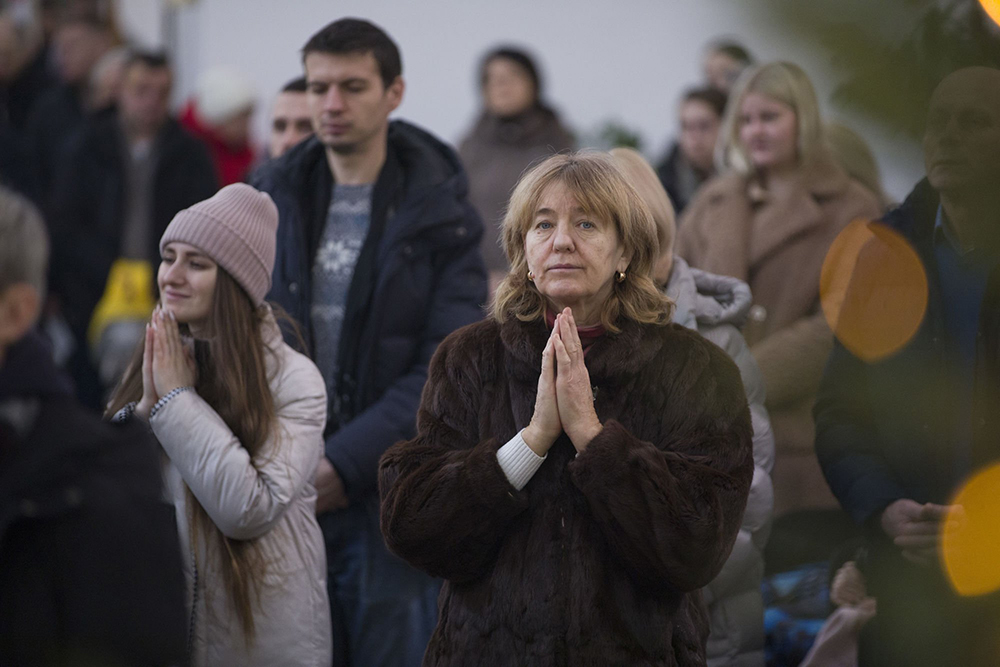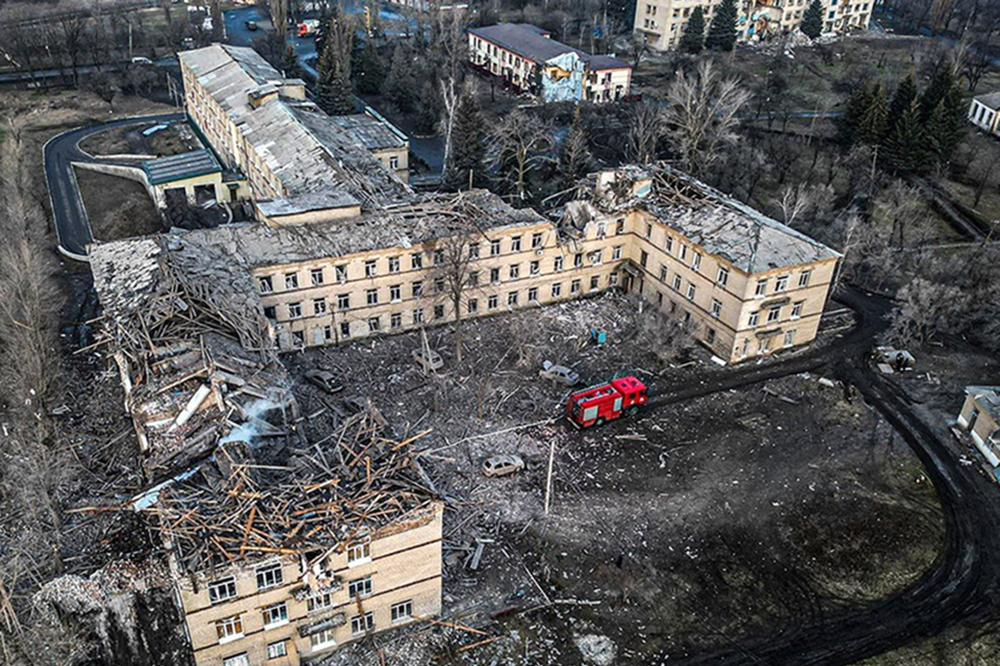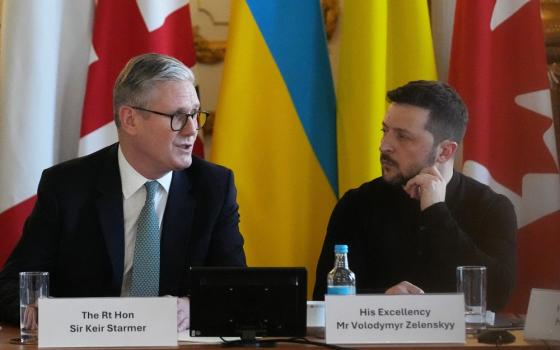
Worshippers pray the blessing of water on the Dnipro River after Major Archbishop Sviatoslav Shevchuk, head of the Ukrainian Greek Catholic Church, celebrated a Divine Liturgy Jan. 6, 2024, at the Patriarchal Cathedral of the Resurrection of Christ in Kyiv amid ongoing Russian aggression in Ukraine. (OSV News/Courtesy of Ukrainian Greek Catholic Church)
As an emergency bill to replenish dwindling ammunition and supplies for Ukraine's forces languishes in the U.S. House, Metropolitan Archbishop Borys Gudziak of the Ukrainian Catholic Archeparchy of Philadelphia warned that failing to support Ukraine as Russia's war machine relentlessly presses its attack will have a vast impact on religious freedom in the region as well as on global security.
The House left for a recess Feb. 15 without first bringing a Senate-passed bill providing military and humanitarian aid to Ukraine and other allies facing conflict to the floor for a vote. Two days later, a Ukrainian stronghold fell to Russia with defenders saying they ran out of needed ammunition to hold back Russia's forces.
"It's really quite amazing, because there's so much devastation, there's so much death, there's so much displacement, and yet the people are pretty clear in their resolve," Archbishop Gudziak told OSV News in an interview ahead of the second anniversary of Russia's invasion of Ukraine. "There are principles we have to defend, and we really don't have any choice, because wherever there is Russian occupation, there is genocide. So, if we don't defend ourselves, we'll be killed."
The Senate recently passed an approximately $95 billion aid package for Ukraine, Israel and Taiwan, following months of a stalemate amid growing divisions within the Republican Party over the role of the United States as a world leader.
But the legislation faces an uncertain future in the House even as European allies are calling on the U.S. to resupply Ukraine's forces with ammunition for the sake of their collective security, and as Catholic agencies report persecution in parts of Ukraine under Russian occupation.
Advertisement
The White House, which is seeking House passage of the Senate's bill, was critical of House Republican leadership for not yet bringing it to the floor for a vote.
First reported by The Hill, White House spokesperson Andrew Bates argued in a memo obtained by that publication that House Speaker Mike Johnson, R-Louisiana, chose to send the House on recess "instead of ending the harm he's doing to our national security."
"Every day that Speaker Johnson causes our national security to deteriorate, America loses. And every day that he puts off a clean vote, congressional Republicans' standing with the American people plunges," Bates said. "Running away for an early vacation only worsens both problems."
Whether or not the House will ultimately take up the bill is not yet clear. Some in the Republican Party have grown skeptical of the U.S. role on the world stage, arguing new policies for the U.S.-Mexico border should be prioritized over foreign aid.
After a bipartisan deal was recently reached in the Senate on compromise legislation — negotiations that delayed aid for Ukraine and Israel for months in order to include border security provisions — Republicans in the Senate and the House aligned with former President Donald Trump, the frontrunner for the GOP presidential nomination, eventually rejected that bill after Trump argued its passage would aid President Joe Biden in the November election. Catholic immigration advocates also had criticized the border provisions in that bill, particularly its restrictions on asylum-seekers.
The White House's national security adviser, Jake Sullivan, said Feb. 15 at a press briefing that "the cost of inaction by the Congress is stark."
"And it's being borne on the shoulders of Ukrainian soldiers," Sullivan said. "We need Congress to pass the national security supplemental bill without further delay."
Sullivan singled out the Ukrainian city Avdiivka, where he said fighting was "intense" and the city was at risk of falling into Russian control.
"If House Republicans do not act soon, what is happening in Avdiivka right now could very well happen elsewhere along that front," he said.
Two days after Sullivan's remarks the Russian military captured the front-line eastern Ukrainian city. The morning of Feb. 17, after the city fell, Biden called Ukrainian President Volodymyr Zelenskyy "to underscore the United States' commitment to continue supporting Ukraine ahead of the two year anniversary of Russia's brutal invasion," according to a White House readout of the call. "(He) emphasized the need for Congress to urgently pass the national security supplemental funding bill to resupply Ukrainian forces."
Gudziak noted that under the 1994 Budapest Memorandum, Ukraine received "security pledges and guarantees from the United States, Great Britain and Russia, who (promised) not only to not invade or demonstrate aggression, but to not even use economic power to shake the sovereignty or independence of Ukraine."
"You had the global community applauding the first nuclear disarmament," he said. "(But now) Ukraine's territorial integrity, its sovereignty has been violated brutally. Ukrainians realize they have to defend themselves and they will do so."
Asked how he would respond to lawmakers opposed to providing aid to Ukraine, Archbishop Gudziak said, "it's so important to understand what the consequences of further Russian occupation may be."
Nearly one-fifth of Ukrainian territory is under occupation, which, he said, "has led to 8 million people crossing the border (with 2 million since returning)."
"If, let's say, even half of Ukraine came under a Russian occupation, you will have at least 10 more million refugees," Gudziak said. "And the displacement of people, but also the (disruption) of global political, diplomatic, economic, food (and ecological) systems ... has led to a hit on all of us."

A destroyed residential building is seen in Selydove, in Ukraine's Donetsk region, after a Russian missile attack Feb. 14, 2024. (OSV News/National Police handout via Reuters)
Gudziak pushed back on arguments that the foreign war doesn't impact Americans.
"Your pocketbook has been hit by the Russian invasion," he said. "Oil prices, food prices went up because of the Russian invasion. Hungry people are starving in Africa or the Middle East because of the Russian invasion."
If Russia advances more deeply into Ukraine or attacks another neighboring nation, he added, "it's going to hit you in your pocket."
"It's going to further affect and destabilize global security," Gudziak said. "And it will empower all the ruffians of the world, whether it's North Korea, Iran or people who are not yet showing that kind of aggression, but (are) just waiting for a signal that nobody's watching anyway."
Russian President Vladimir Putin also seeks the same moral relativism many Catholics oppose, Gudziak said.
"He's not aiming to convince you of Russian righteousness," Gudziak said. "He just wants you to doubt democracy. He wants you to doubt the truth, to believe in nothing. And this is diabolical."
Putin, he added, "has killed for almost a quarter-century — the vicious bombing of Grozny, the capital of Chechnya (in February 2000); the death of journalists and political opposition figures that have happened under his rule; the attack, invasion and annexation of part of Georgia in 2008. In 2024, this war (in Ukraine) is not two years old. It's 10 years old."
"We cannot be naive about this," Gudziak said. "Dear fellow Catholics — your fellow Catholics, your fellow Christians, Protestants and others will not be able to pray freely. Their churches will be closed (and) taken over by the Russian Orthodox Church, as it did with Ukrainian Catholic churches after the liquidation of (its) visible structures (during the Soviet Union)."
Russia's full-scale invasion of Ukraine reaches the two-year mark Feb. 24, and continues attacks launched in 2014 with the illegal annexation of Crimea and the military backing of separatist factions in Ukraine's Luhansk and Donetsk regions.
Two joint reports from the New Lines Institute and the Raoul Wallenberg Center for Human Rights have concluded Russia has breached the Genocide Convention, to which 153 nations, including the U.S. and Russia, are party.
In March 2023, the International Criminal Court issued arrest warrants for Putin and his commissioner for children's rights, Maria Alekseyevna Lvova-Belova, for the unlawful deportation and transfer of 19,546 children from occupied areas of Ukraine to the Russian Federation.




